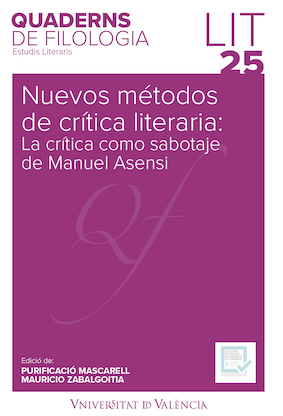The contemporary migration narration from the perspective of criticism as sabotage: three case studies
DOI:
https://doi.org/10.7203/qdfed.25.18980Keywords:
migration, chronicle, borders, critics, sabotage. Abstract
Abstract
This text focuses on a critical analysis of three stories on Central American migration, through the theoretical tool proposed by Manuel Asensi, “criticism as sabotage”. In particular, it studies three chronicles –Los migrantes que no importan. En el camino con los centroamericanos indocumentados en México (Martínez, 2010), Los niños perdidos. Un ensayo en cuarenta preguntas (Luiselli, 2016) y Yo tuve un sueño. El viaje de los niños centroamericanos a Estados Unidos (Villalobos, 2018)–. The analysis will focus on elements such as: the narrator, his positioning; the presence of explicit or hidden syllogisms; the proposal of “world models” arising from issues directly or indirectly linked to the general theme of migration.
 Downloads
Downloads
Downloads
Published
How to Cite
-
Abstract529
-
PDF (Español)430
Issue
Section
License
 Este obra está bajo una licencia de Creative Commons Reconocimiento-NoComercial-SinObraDerivada 4.0 Internacional.
Este obra está bajo una licencia de Creative Commons Reconocimiento-NoComercial-SinObraDerivada 4.0 Internacional.
Authors who publish with this journal agree to the following terms:
- Authors retain copyright and grant the journal right of first publication with the work simultaneously licensed under a Creative Commons Attribution License that allows others to share the work with an acknowledgement of the work's authorship and initial publication in this journal.
- Authors are able to enter into separate, additional contractual arrangements for the non-exclusive distribution of the journal's published version of the work (e.g., post it to an institutional repository or publish it in a book), with an acknowledgement of its initial publication in this journal.
- Authors are permitted and encouraged to post their work online (e.g., in institutional repositories or on their website) prior to and during the submission process, as it can lead to productive exchanges, as well as earlier and greater citation of published work (See The Effect of Open Access).




